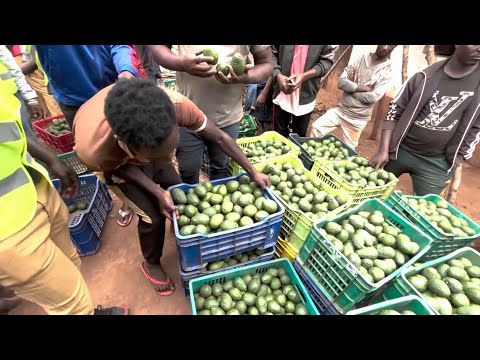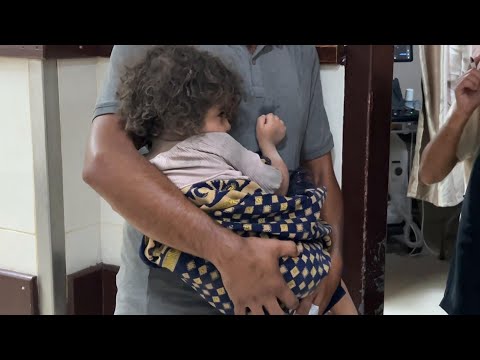(7 Oct 2024)
RESTRICTION SUMMARY:
ASSOCIATED PRESS
Kayanza, Burundi – 19 September 2024
1. Various of crates full of avocado being sorted, weighed and loaded onto a lorry
2. SOUNDBITE (Kirundi) Eric Nsabimana, Farmer, Avocado Collector:
"I collect avocados from farmers in this area because the people here trust me. They bring anything from two crates to ten, twenty crates and I deliver them to be exported."
3. Wide pan of avocado trees
4. Various of avocado farmer Zacharie Munezero walking around his farm
5. Munezero explaining the features on an avocado variety
6. SOUNDBITE (English) Zacharie Munezero, Avocado Farmer:
"For a season, we can get an estimated two million kilograms. That is like two thousand tonnes (of avocado). But for Hass and Fuerte (varieties). But for Choquette (variety), they sell it for bags (a lot of it). Choquette and Brogden."
7. Ferdinand Habimana, who is vice president of Green Gold (Burundi’s avocado administrative board)
8. SOUNDBITE (Kirundi) Ferdinand Habimana, Vice President of Green Gold Burundi:
"The Food and Agriculture Organization (FAO) recently released a list of countries that export avocados and Burundi was not among them. That is why we moved quickly and did our best to get certification that will allow us to be among the exporting countries and now we can."
9. Various of avocado trees growing on hillside
ASSOCIATED PRESS
Bujumbura, Burundi – 18 September 2024
10. SOUNDBITE (English) Onesime Niyukuri, Foreign Trade Advisor:
"The world has actually seen that avocados can be developed and it can also be a source of income for the producers of the crops and also for the governments, a source of foreign currency by exporting enough product. We expect that in five years we will be able to export more than ten million tonnes of avocado."
ASSOCIATED PRESS
Kayanza, Burundi – 19 September 2024
11. Munezero explaining the features on an avocado variety
12. SOUNDBITE (English) Zacharie Munezero, avocado farmer:
"We learn from others, if you can see Mexico exporting avocados for around three billion US dollars a year. Why not us? We have the land for opportunity to plant these avocados."
13. Various of avocado in crates being loaded onto a lorry
STORYLINE:
Farmers in a remote part of Burundi know to look for a truck parked by a highway when they want to sell their avocados.
They materialize from villages and form a crowd, watching closely as crews working for export companies in neighboring African countries weigh and load the crated fruits.
Such roadside exchanges, repeated regularly during peak harvest season, long provided a ready market for small-scale avocado growers in a country that’s sometimes ranked as the world’s poorest.
But the transactions now promise real earnings as well thanks in part to the intervention of the national government and farmers’ cooperatives that worked to set terms for foreign avocado dealers.
Just a year ago, farmers selling their avocados to the transporters earned 10 cents per kilogram (2.2 pounds), less than the price for small bottle of water. These days, farmers get roughly 70 cents for the same quantity, a meaningful increase for people who mainly farm to feed their families.
Another change: Payments in U.S. currency now go into the bank accounts of farmers’ cooperatives that pay their members directly almost as soon as the avocado haulers leave.
Avocados are cheap in many parts of sub-Saharan Africa, where they can be purchased from farmers in bulk for almost nothing.
Find out more about AP Archive: http://www.aparchive.com/HowWeWork
Twitter: https://twitter.com/AP_Archive
Facebook: https://www.facebook.com/APArchives
Instagram: https://www.instagram.com/APNews/
You can license this story through AP Archive: http://www.aparchive.com/metadata/youtube/e8a47367e10b4d61b56ea40624089dfd
Author: AP Archive
Go to Source
News post in October 12, 2024, 6:04 am.
Visit Our Sponsor’s:
News Post In – News





